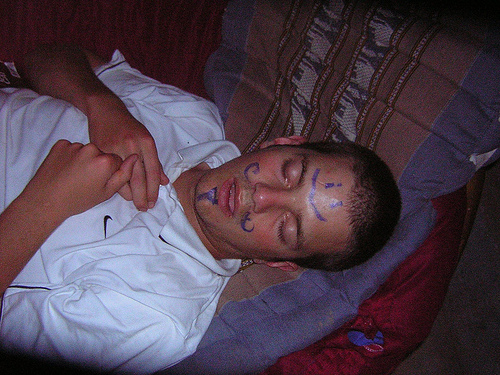It is best to rise from life as from a banquet, neither thirsty nor drunken. – Aristotle
What does that mean?
If I had been thinking, this would have been posted on the 31st of December, where it would have been a bit more topical. However, with the events of New Years Eve still fresh in your memory (either from experience or observation), there is still benefit to be had from this line of inquisition.
Aristotle is famous for his doctrine of the “Golden Mean,” which states there is a happy medium between the extremes of too much and too little. In this case, he is discussing the imbibing of alcoholic beverages. If you drink too little, you are left thirsty, and that’s not good. If you have too much, you are drunken, and that’s not good either.
According to the quote, the best path is somewhere in-between, drinking neither too little, nor too much. The quote says that you should behave in life as you would at a banquet. Enjoy yourself and have fun, but neither too much, nor too little.
Why is ‘just right’ important?
I don’t know if the story of Goldilocks was designed to make this point, but is certainly does fit the pattern, doesn’t it? Porridge that is too hot, too cold, then just right. Chairs that are too large, too small, then just right. Beds that are too soft, too hard, then just right. In each case, the one in the middle (the mean) is the best.
The story is so well known that it is even used in astronomy, where a planet is considered “in the Goldilocks zone” if it is neither too close nor too far from it’s sun. While some other cultures may not be as familiar with the story, research shows it was well known throughout Europe in the early 1800’s.
This principle is also well known in the Orient, as it is echoed in the teachings of Confucianism, Buddhism and Taoism. It is probably part of many other religions and philosophies of which I am not familiar. The point is I expect that all of you should have heard something about avoiding the extremes at some point in your life.
Where can I apply this in my life?
So, how did New Years Eve go for you and your friends? Did any of you do a little too much partying? Did anyone go to bed early, and by default do too little partying? Do you know of anyone who did too much or too little? Who had the most fun, those who did too much, too little, or just the right amount?
Where in your life, besides partying, do you sometimes do to excess? Before you answer, I would caution that there are times and places for doing things that would otherwise be considered excessive. If you want to drive fast, it would be excessive to do it on the streets, but proper at a race track. Driving as if you were on the street while on a race track would be way too slow, right?
Grab some paper and start listing the things that you do that are outside the mean, either too much or too little. For me, the TV and my computer (games) tend to be my excesses, and partying tends to be where I do far too little. I’m an introvert and an engineer, which explains everything, right?
Take a look at what you do outside of the mean, and see if you can see a pattern. In my case, being an engineer, I like technology far more than people, so that covers the bulk of my non-mean behavior. How about you, is there some aspect of your personality or attitudes, beliefs or values that explain your behavior preferences?
Before we go farther, we have to decide which of these activities or behaviors you actually want to change. Also realize that what I consider too excessive may well register as too little for you. So which parts do you want to change and by how much?
Now consider why you do what you do. Do you party hard because you hang out with some serious party people? Do you not party at all because you’re too big a nerd or a bit of a loner? You can change the pattern of your behavior by changing your mix of friends. That doesn’t mean cutting them out of your life, but try spending a Friday night with a different crowd every once in a while, and see how it works for you.
This is probably the most subjective topic yet considered here, so you will have to find your own “happy path” down the middle of life’s road. And remember, there are potholes in all portions of the road, so don’t expect it will get easier, but you just might have fewer massive hangovers. 8)
From: Twitter, @AncientProverbs
confirmed at : http://www.brainyquote.com/quotes/quotes/a/aristotle161829.html
Photo by Tiddle








The bizarre doctrine of the golden mean has been systematically discredited for the fallacy that it is in the following essay composed by a logician : http://www.davidagler.com/teaching/criticalthinking/handouts/Handout14_GoldenMeanFallacy.pdf
The article you reference is interesting, but a bit over-simplistic. Anyone who believes the golden mean should be enforced in all things isn’t very bright. Those who believe the word ‘mean’ should be taken mathematically aren’t much brighter.
Just as there are some times when the concept is clearly not applicable (slavery, as an example), there are times when it is (drinking at a banquet, as an example). Unless you are advocating that one should never drink at a banquet, or always become drunken at one, that is.
Thanks for your comment, and I welcome your response.